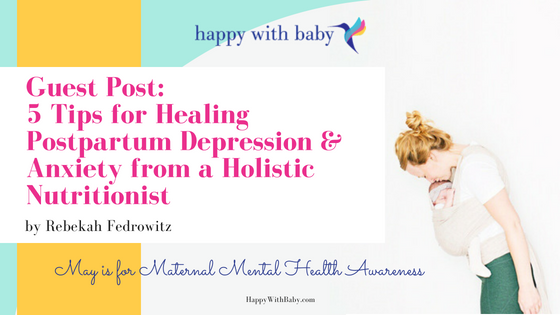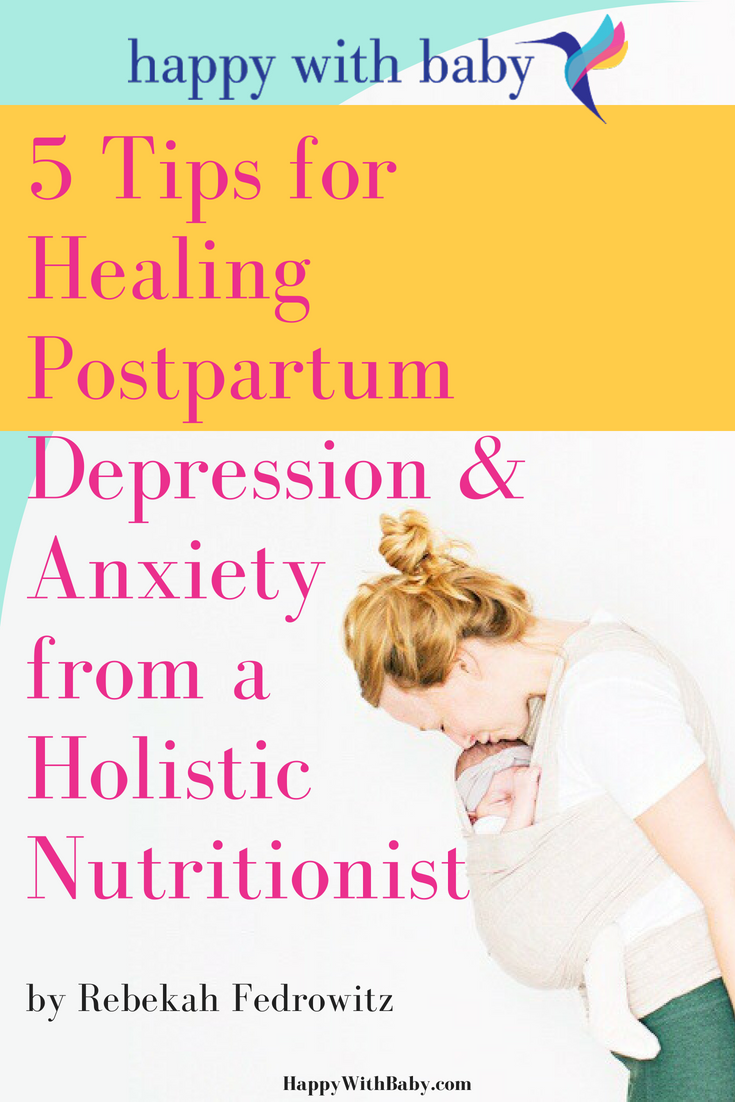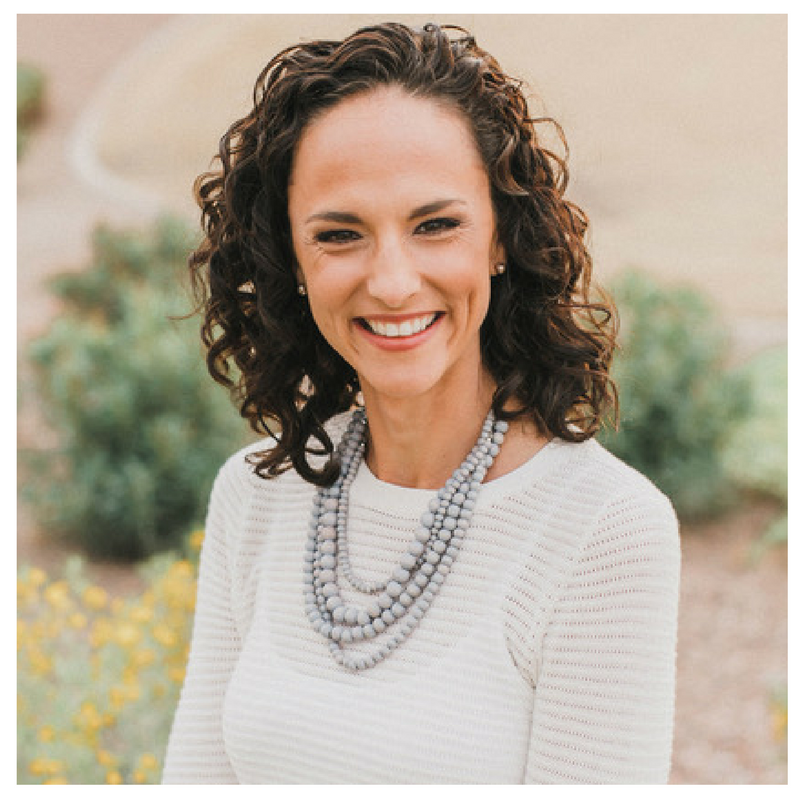Guest Blog: 5 Tips for Healing Postpartum Depression & Anxiety from a Holistic Nutritionist

Written by Rebekah Fedrowitz
Becoming a new mom is one of the happiest times in a woman’s lives. The love and joy that comes from simply watching your baby is unlike any other experience, filling you with love, satisfaction and contentment.
But what happens with those emotions are juxtaposed with feelings of worry, anxiety, and even sadness? The love and joy are welcomed, but the others are not, and the combination of feelings can be overwhelming.
That’s what happened to me.

The first couple days after my son was born were blissful. I was tired, and breastfeeding was unbelievably difficult, but I was happy and completely enamored with my sweet little baby. Then, without warning, I found myself overcome with a gripping fear. It was a haunting anxiety of all the things that could possibly go wrong, and it hit me unexpectedly. It was uncontrollable, and so very unwelcome.
At first, I thought it was just an adjustment period and a normal part of motherhood, but it didn’t get better, and it was not normal.
As much as I read and researched about pregnancy, natural delivery and postpartum care, and infant health, I was still very underprepared for identifying and addressing my challenges with postpartum mental health. Overall, most of the education around postpartum mental health is related “baby blues,” while postpartum depression (PPD) and anxiety (PPA) are often not discussed openly. When PPD and PPA are present, it’s easy to feel guilty about the mixed emotions and to find yourself alienated from other people who aren’t having those same feelings.
It took me a while to really identify all the signs, but once I did, I’m thankful that I had the knowledge and the tools to combat my PPA/PPD. One of my goals now is to help others who are suffering from PPD/PPA, and more importantly, to prevent it from being as common as it is.
If you’re a new or expecting mom, or know someone who is, here are a few practical recommendations that can help prevent or address postpartum mental health challenges.
1. Stress less.
If you’re currently pregnant or planning to be pregnant, managing your stress well during your pregnancy is essential! High levels of stress during pregnancy can increase the risk of PPD/PPDA. And for me, I believe this was my biggest trigger. Pregnancy can be a stressful time, from the physical demands to preparing yourself for a major life change, but finding ways to manage that stress is helpful for both you and your baby.
2. Clean up your diet.
Complete health, including your mental health, starts with good nutrition. Sometimes during pregnancy and postpartum, our cravings and energy swings can make it hard to eat as balanced as we should, but it’s more important now that ever! Keep sugar, refined carbohydrates, alcohol, and caffeine to a bare minimum, and focus on getting at plenty of health fats, clean proteins, and at least five servings of fibrous vegetables every day. If you’re unsure of the best sources of foods to eat, you can download my free grocery guide for healthy eating here.
3. Support increased nutritional demands.
Specific nutrients, such as omega-3 fatty acids and B vitamins, have been found to support mental health. During pregnancy and postpartum, those very nutrients can be in higher demand and are often under-consumed in the diet. Specific supplements that are generally helpful for pregnancy and postpartum, as well as for support of PPD/PPA include: a prenatal omega-3 fatty acid, a broad-spectrum probiotic, and a prenatal with ample B vitamins (or potentially a separate B complex).
Disclaimer: Not all supplements are recommended during pregnancy and breastfeeding. Exercise caution and always consult with a qualified healthcare professional before starting or changing your diet or supplements.
4. Talk about it!
It can be hard to open up and share how you’re really feeling, yet it can be so helpful if you do. You’ll likely find that there are a number of moms feel the same as you do, but they, too, are afraid to share. Just talking about it without another mom may help you release some guilt and stress, and that alone can be therapeutic. Also, be honest and open with your spouse, and seek out professional counseling if things don’t improve quickly.
5. Ask for help.
Why do so many women struggle to ask for help? It seems to be an innate characteristic of many women, especially moms. Whether it’s having a friend watch your baby so you can take a shower, or having your husband pick up dinner to go, letting go of any task can often make us feel like we’ve let someone down or we’ve fallen short of our own standards. If I learned one lesson from having my son, it’s that I can’t do it all alone…and let me tell you, that was a hard lesson to learn. Make a list of 5 things you would gladly take your plate right now if you could, and then see if there is any way you can remove even just 1 of them. Hire someone to clean your house, ask a friend to watch your baby for a couple hours, or get your groceries delivered. It’s not forever, and you haven’t failed.
Remember: You are wonderful. You are loved. You deserve to be well, and you can be!
ABOUT REBEKAH FEDROWITZ:

Rebekah Fedrowitz is a board certified holistic nutritionist and the founder of You Are Well, a natural health and holistic nutrition company.
Rebekah is passionate about helping women escape the traps of their so-called “normal” health challenges through scientific and customized approaches that address the root issues. She believes that nutrition is an important part of the body’s healing process, and with the right nutrition, we all can obtain the complete mind-body-spirit wellness God intended for us to have.
CONNECT WITH REBEKAH:
Subscribe
Sign up to get the latest weekly blogs sent straight to your inbox


0 comments
Leave a comment
Please log in or register to post a comment